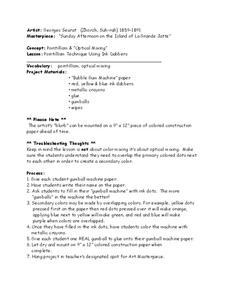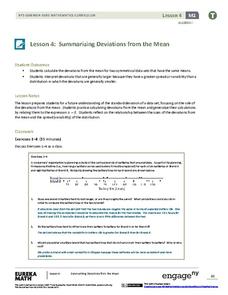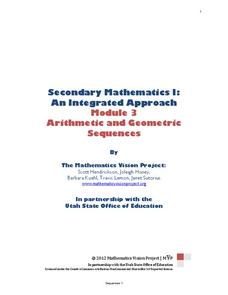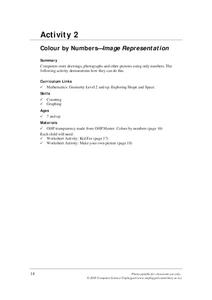Curated OER
Addition and Connecting Dots in a Picture
For this addition worksheet, students solve 60 problems in which one and two digit numbers are added. Students use the sums to connect the dots in a complex picture of the Eiffel Tower.
Curated OER
Welcome to the Zoo
In this recognizing the letters of the alphabet worksheet, learners connect the dots from a to o in sequence to form the letter z. Students connect fifteen dots.
Curated OER
DeNelian Printing Practice- A to Z with Words
In this language arts worksheet, students learn to form both upper and lower case DeNelian letters A-Z. Students trace the dotted examples of each letter and words that begin with that letter. Students then form their own examples on the...
Curated OER
Pointillism Technique Using Ink Dabbers
A gumball machine art project is a great way to learn about optical mixing in a study of pointillism and Georges Seurat. Kids create their own masterpieces and learn about primary and secondary colors in the process.
EngageNY
Measuring Variability for Symmetrical Distributions
How do we measure the deviation of data points from the mean? An enriching activity walks your class through the steps to calculate the standard deviation. Guiding questions connect the steps to the context, so the process...
Computer Science Unplugged
Marching Orders—Programming Languages
Computers need precise directions to complete a task. Class members experience what it is like to program a computer with an activity that asks one pupil to describe an image while classmates follow the directions to duplicate the picture.
Teach Engineering
Fun With Nanotechnology
Introduce your class to nanotechnology applications with three demonstrations that showcase scientific principles related to ferrofluids, quantum dots, and gold nanoparticles. Groups will work more closely with these applications in the...
Dick Blick Art Materials
Woodsies “Extraordinaire”
"This looks like an owl!" Kids get a chance to create all sorts of things by arranging various shapes, painting them, and gluing them together. A great way to encourage creativity and spontaneity.
NASA
Raisin Bread Universe
What is the universal breakfast? The resource includes two activities, the first one observing oatmeal to understand the texture of the universe. Then, scholars measure raisin bread dough before and after it rises to represent the...
Utah Education Network (UEN)
Statistics
Find the value in analyzing data values. Statistics is the focus in the fifth of seven installments of the 6th Grade Math series. Individuals learn to examine dot plots, histograms, and box plots by considering the shape, mean, median,...
Freeology
Upper and Lowercase Ss
Develop stronger handwriting capabilities with a tracing and writing worksheet featuring the upper and lowercase letter S.
Mathematics Vision Project
Module 1: Sequences
Take steps into sequences. An 11-lesson unit builds upon pupils' previous understanding of writing expressions to develop the idea of sequences. The resource explores both arithmetic and geometric sequences using recursive and explicit...
Curated OER
James and the Giant Peach Plot Analysis
It's all about the plot, main events, and story mapping with this lesson. As the class reads the novel James and the Giant Peach, they create an excitement graph that actually charts key events and moments of excitement. After...
Granite School District
Activities that Build Number Sense
Have fun while building the number sense of young mathematicians with this list of ten-frame learning games. From developing cardinality and counting skills to learning place value and basic addition strategies, ten-frames are excellent...
EngageNY
Summarizing Deviations from the Mean
Through a series of problems, learners determine the variability of a data set by looking at the deviations from the mean. Estimating means of larger data sets presented in histograms and providing a way to calculate an...
EngageNY
Understanding Variability When Estimating a Population Proportion
Estimate the proportion in a population using sampling. The 20th installment in a series of 25 introduces how to determine proportions of categorical data within a population. Groups take random samples from a bag of cubes to determine...
EngageNY
More Practice with Box Plots
Don't just think outside of the box — read outside of it! The 15th instructional activity in a 22-part unit provides pupils more work with box plots. Learners read the box plots to estimate the five-number summary and interpret it within...
Hookshot Creative
Compose Your Own Music
Channel the masters with an interactive music composition activity! Learners use the online tool to create their own masterpieces one measure at a time.
Curated OER
Aboriginal Hand Prints
A part of a study of Australian Aboriginal culture, class members listen to a Dreamtime story about a father who stenciled his handprint on a rock wall. Class members then make their own hand print art representative of themselves...
Khan Academy
Challenge: Mouse Tracker
Create a small but useful little program that allows you move a dot with your mouse and see the coordinates change as the mouse moves. Starting with a dot that moves with the mouse, add to this program the text of the points...
Mathematics Vision Project
Module 3: Arithmetic and Geometric Sequences
Natural human interest in patterns and algebraic study of function notation are linked in this introductory unit on the properties of sequences. Once presented with a pattern or situation, the class works through how to justify...
Statistics Education Web
Who Sends the Most Text Messages?
The way you use statistics can tell different stories about the same set of data. Here, learners use sets of data to determine which person sends the most text messages. They use random sampling to collect their data and calculate a...
It's About Time
Reflected Light
The lesson allows young scientists to use lasers and mirrors to study reflected light. A reading passage and homework question assess learning, while additional material introduces extension activities.
Computer Science Unplugged
Colour by Numbers–Image Representation
How do computers store and send images? Here's an activity that explains one way a computer can compress image information. Pupils decode run-length coding to produce a black and white image. Pairs then work together to code and...
Other popular searches
- Dot to Dot Worksheets
- Dot to Dot Puzzle
- Alphabet Dot to Dot
- Dot to Dot Picture
- Halloween Dot to Dot Picture
- Dinosaur Dot to Dot
- Duck Dot to Dot
- Dot to Dot 1 30
- Cat Dot to Dot
- Number Dot to Dot
- Dot to Dot Fish
- Dot to Dot Heroes























